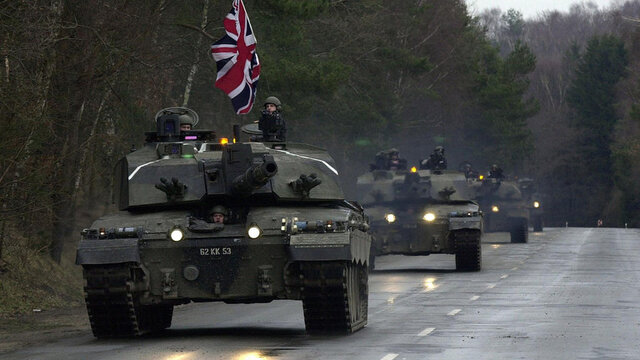Seyyed Reza Mirtaher, referring to the UK measures to send heavy weapons to Ukraine, including the donation of 600 Brimstone 2 missiles and allocation of 14 advanced Challenger tanks, self-propelled guns and Bulldog armored vehicles. told the Strategic Council on Foreign Relations that Britain, as a strategic ally of the United States, has always played a prominent role in intensifying the hostility of the West against Russia, and the history of tensions between Russia and the UK is long.
He stated that the Russians consider the British to be one of their worst enemies and said that after the Cold War, despite the collapse of the Soviet Union and some improvements in their relations, there were many tensions between them, including the issue of the radioactive assassination of some Russian agents who had become refugees in the UK or were living in that country. This issue was one of the main causes of political-diplomatic tensions and even the expulsion of Russian diplomats and then the reciprocal expulsion of British diplomats from Russia.
This expert on international issues continued that these tensions between Russia and the UK continued, especially after Russia attempted to seize Crimea and annex it to its territory in 2014, and a serious confrontation between the West and Russia was created. And Moscow has always been incremental, and the war in Ukraine in February 2022 also created a turning point in this direction.
Referring to the actions taken by the West, especially the United States, during the Ukraine war against Russia, Mirtaher added that Britain, as a strategic ally of the United States, played an active role in this regard. Along with the US, they have sent the largest amount of arms aid to Ukraine. In 2022, Britain sent more than 2.3 billion dollars of weapons to Ukraine, and it is expected that this country will send another 3 billion pounds of weapons to Ukraine this year.
This analyst of international issues noted that at the same time, they have also made progress in sending tanks to Ukraine, and London’s action in sending advanced combat tanks is considered a turning point in the field of Western arms aid to Ukraine. In fact, Britain will be the first country to donate Western tanks to the armed forces of Ukraine, and Germany has so far refused to do so because it believes that Leopard tanks are offensive weapons, and has emphasized that Western tanks should only be delivered to Kiev by concluding an agreement between Ukraine’s main allies, especially with the US.
While referring to the British Defense Minister’s emphasis that Germany should also send heavy equipment, especially combat tanks, to Ukraine, he said that Edward Stringer, the former head of operations at the British Defense Headquarters, said that time is in Russia’s favor, so the West should intensify its support for Ukraine it in the coming months and abandon the caution it has taken about arms delivery.
“Naturally, it is expected that the UK, along with the United States, will take the lead in action against Russia and implement this decision in a few days. One of the dimensions of this action was the energy embargo. Britain has drastically reduced energy imports from Russia and in this regard has threatened other European countries to continue this path.”
This analyst of international issues stated that London, along with Washington, was a pioneer in supporting and leading the political-diplomatic campaign and psychological-propaganda war against Moscow, and most actions in this field were carried out in cooperation with the United States on the part of the United Kingdom. With the US, it has tried to continue and expand the scope of the war in Ukraine by sending huge amounts of all kinds of weapons, especially heavy weapons to Ukraine, and in this action it pursues the strategic goals of continuing the war in order to weaken Russia and create an international front against it.
Mirtaher stated that Britain wants to intensify the hostilities between Europe and Russia and to distance them as much as possible, and said that London has repeatedly expelled diplomats and sanctioned Russian officials, personalities and institutions, and of course this action has also brought Moscow’s counter reactions.
He emphasized that after the US, Britain has shown the highest hostility towards Russia and this issue has existed since the Cold War period. Even now, this effort has continued in a general and increasing manner. Big European countries, such as Germany and France, never wanted relations with Russia to reach an irreversible level and until the Ukraine war, they were willing to continue cooperation, especially in energy, industry and commercial interactions. While Britain and the US are acting completely against this idea and are trying to reduce Russia’s presence in European markets as much as possible and to reduce the level of Moscow’s relations with European countries as much as possible.
This international affairs analyst stated that the UK recently announced that a group of 9 countries, such as the UK, Poland and the Netherlands, have committed to pursuing an unprecedented set of arms donations to Ukraine, including advanced battle tanks.
Referring to London’s active diplomacy to provide as many weapons as possible, he pointed out that for the US and UK, the continuation of the war in Ukraine and turning it into a war of attrition, considering the weakening of Russia’s power and influence and the convergence of Europe with the strategies of these two countries, provides many opportunities and they can take advantage of this and use the convergence created in their future goals.










0 Comments